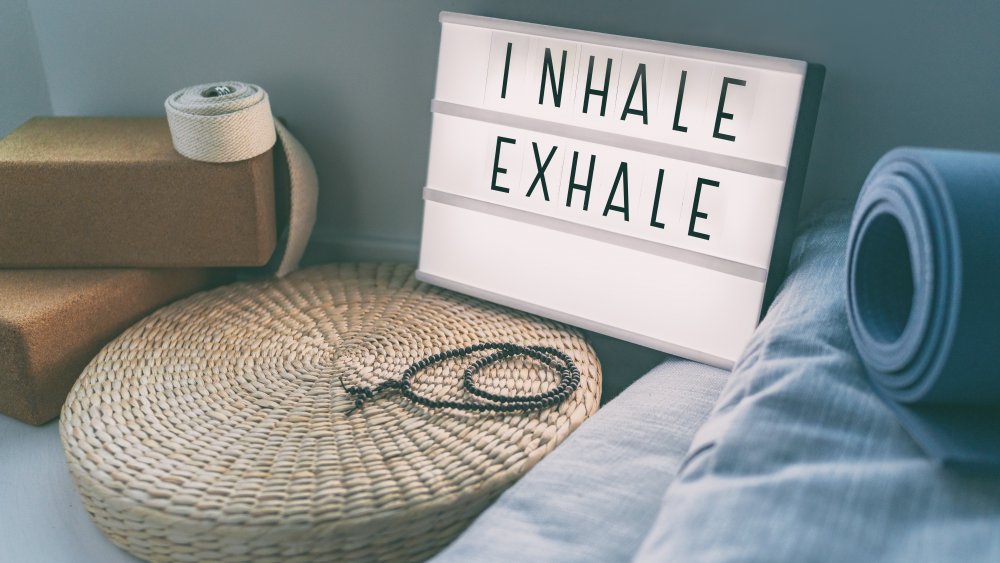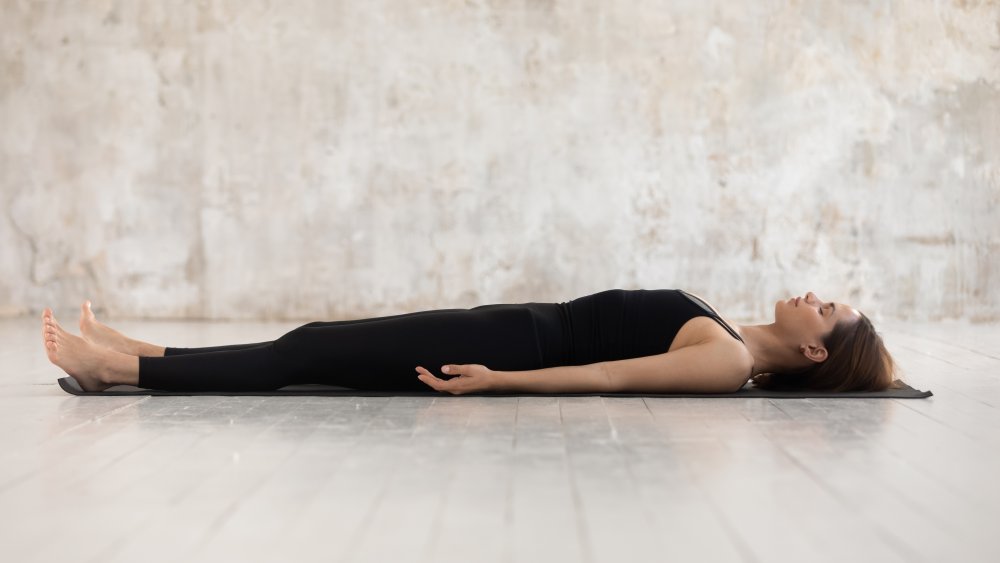This Is Why You Should Try Yoga If You're Stressed
At some point or another, we've all experienced stress, and some of us have even learned to co-exist with baseline stress. That being said, chronic stress can be detrimental to our long-term well-being and so it's important that we learn to manage it appropriately. While many are familiar with the physical benefits of consistent yoga practice, the mental benefits should not be overlooked.
The word yoga comes from the Sanskrit root "yuj" which means yoke or union (via International Journal of Yoga). Leslie Luft, an experienced registered yoga teacher and owner of Absolute Yoga studio, tells Health Digest exclusively, "For many, myself included, it starts as a physical practice, to stretch tight muscles, strengthen weaker parts, and quiet the mind. But over time, the meaning of yoga shifts and evolves." She goes on to say, "While yes, the body may be stronger and more flexible, the mind may not be as busy as it was, through this physical practice, the deeper meaning of yoga arises and you realize that what you are learning on your yoga mat in your physical practice has a great effect on how you conduct your life off your mat."
The mind-body connection
It is known that when deeply stressed and anxious, your body tenses up and becomes stiff, uncomfortable, and you may even experience pain (via Psychology Today). The physical practice of yoga can help alleviate some of that bodily discomfort. It teaches you to consciously relax and stretch your muscles and to let go of the mental weight the body carries, especially in the jaw, neck, and shoulders. Yoga has many physical health benefits including increasing flexibility, reducing tension, decreasing the risk of heart disease, increasing bone health, and much more (via Yoga Journal).
The physical practice of yoga is deeply intertwined with the mental practice. There are several research findings covering a variety of yoga practices that seem to suggest that yoga can reduce the impact of exaggerated stress responses and may be helpful for both anxiety and depression (via Harvard Health Publishing). Luft says, "You start to realize that you are more present for yourself and for those around you. You're more mindful and aware and have greater clarity about yourself and your life experiences. You begin to respond instead of react." Often times in life, reacting, instead of responding, cultivates and perpetuates additional stress, so learning to break the cycle is key.
The importance of the breath in yoga
You've probably found yourself mindlessly entering those patterns of worry. Worrying about things that have already happened or that may happen in the future. Yoga emphasizes the power of letting go of those worries and returning back to your body and breath, over and over. Luft explains, "The breath is the vehicle that supports your yoga practice. Breathing does not require conscious awareness; our breath happens regardless of whether we focus on it or not. However, when you bring your conscious awareness to the breath, the mind becomes anchored on the breath, the present moment. It moves away from what has occurred in the past and not worrying or planning for what may happen in the future. This moment brings you into the present which is free of past grievances or sadness as well as future expectations or plans. It is here where the mind can find peace and where stress and tension can be reduced."
Yoga reduces stress
Yoga encourages you to slow down and focus on the breath. When you're stressed, even subconsciously, your body's sympathetic nervous system (SNS), responsible for "fight or flight" response, is activated. This triggers the heart rate to increase and breaths to become shallower. Yoga helps to shift from the SNS to the parasympathetic nervous system (PNS), responsible for our "rest and digest" functions. The PNS is more calming and restorative, lowering heart rate, decreasing blood pressure, and lowering cortisol levels. Luft continues, "Yoga, through its focus on the breath, brings us back to our natural state of being in balance, encouraging the actions of the PNS, through restoration and recovery, offering the body a time to heal from stress-related symptoms."
There is no denying the effectiveness of yoga as a stress-reducing technique and quite a beneficial one at that. So, in the true nature of yoga and mindfulness, there is no better moment than the present to roll out your mat and start relieving that stress you've been carrying around for far too long.




